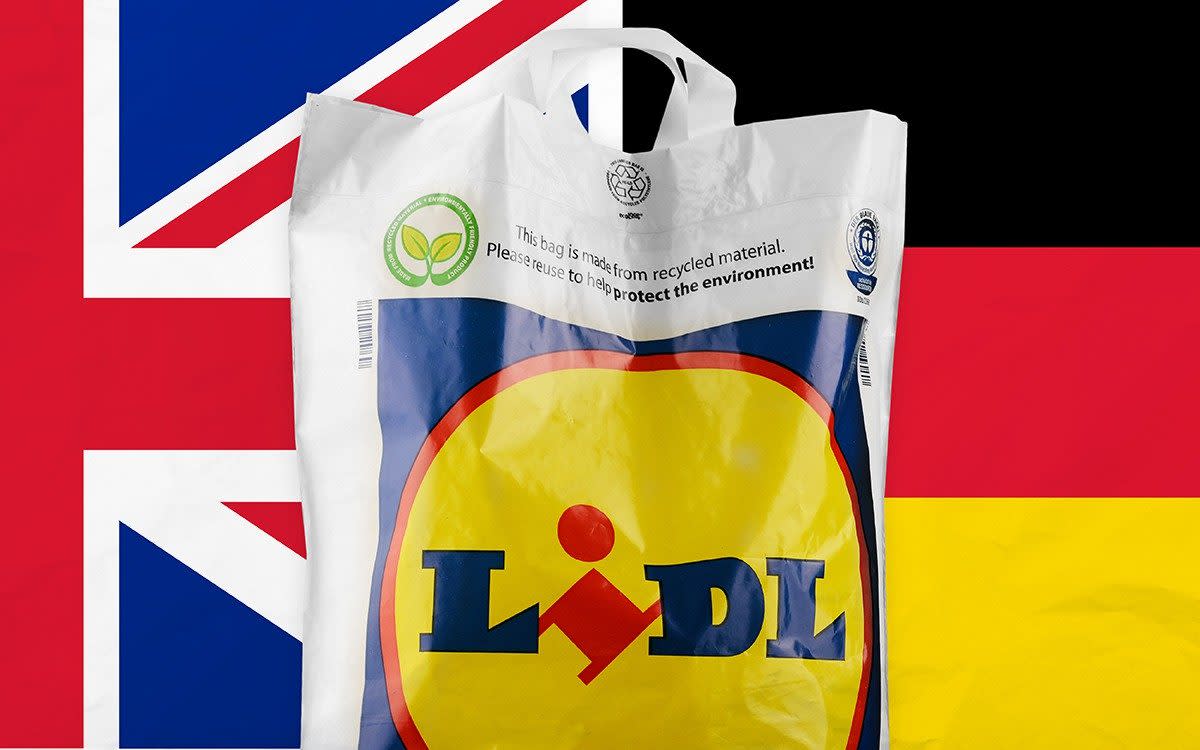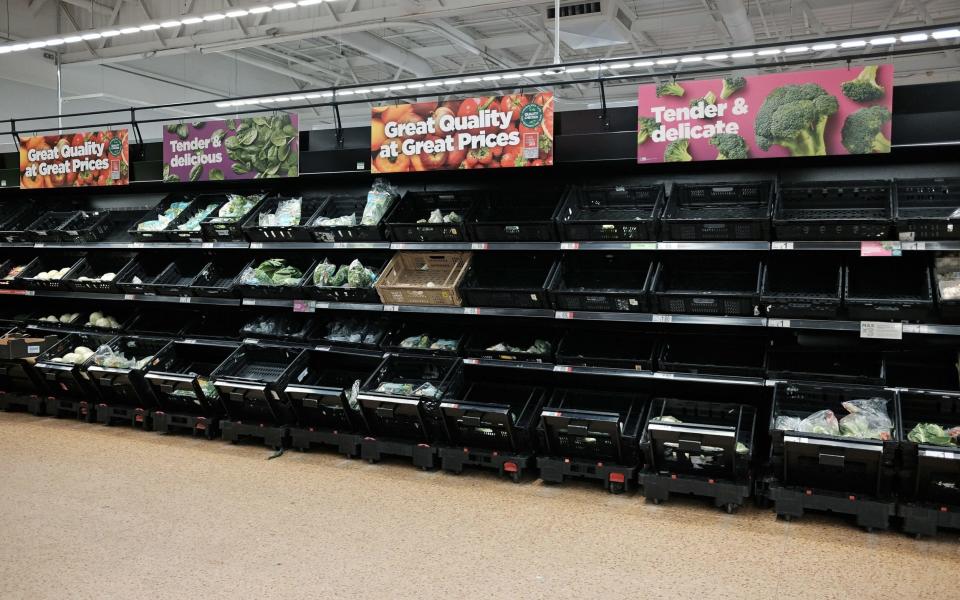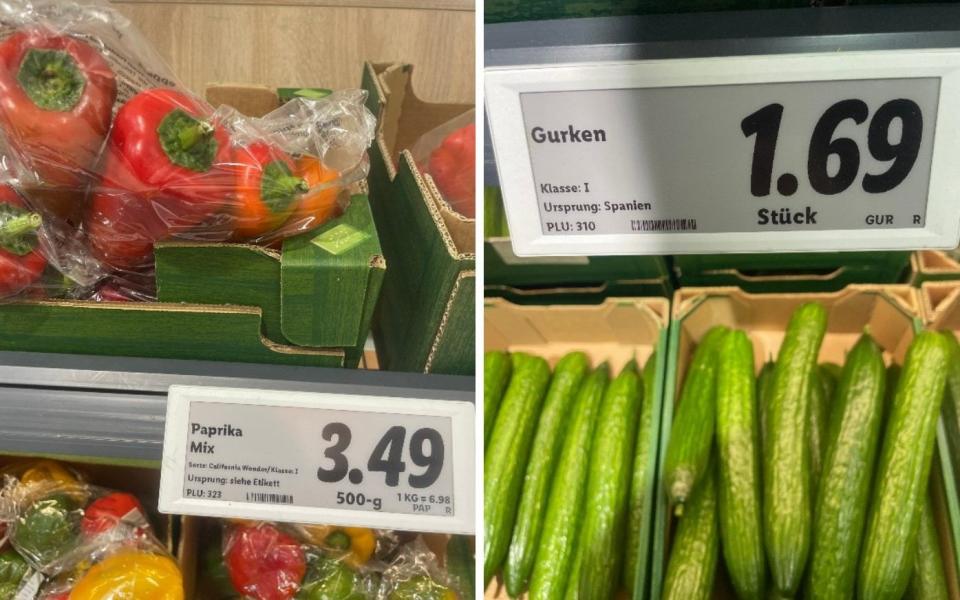The overlooked reason our supermarket shelves are bare (and no, it's not Brexit)

I love a supermarket. Especially when I’m on holiday. A little nosy around foreign aisles tells you volumes about the eating habits of that country and region. Which ingredients merit entire shelf stacks? What have they chosen to display at eye level? What flavours does the ice cream come in? And as for the crisps… someone told me that Germany’s Lidl does a bolognese variety, and this has to be worth a detour from the Gemäldegalerie.
Last week, I found myself in Lidl in the Pankow district of Berlin. Those bolognese crisps were a draw, but I had, I admit, another agenda. Since the Great Salad Shortage of 2023 hit last month, friends on the continent have been gleefully pointing out that their local supermarché, supermercato and mataffar (Swedish, extra smug) have all the lettuce, cucumber and tomatoes they could want. Not a whiff of vegetable rationing here, they point out.
The reasons for our own understocked produce shelves over the past weeks have been picked over more closely than a punnet of raspberries (I’ve argued elsewhere about our worrying obsession with salad in winter). There’s the cold weather and now drought in Spain and Morocco (two of our chief sources) damaging plants. Then the war in Ukraine has raised fuel prices, which in turn has made it uneconomic for some farmers to plant crops, while also raising grain prices – meaning others have switched away from veg to wheat production.
Yes, say my friends, we have those pressures, too – so your problem must be about Brexit, right? Our divorce from the European Union certainly plays a part. The “additional friction” (for which read time, money and paperwork) at borders post-Brexit makes importing just that bit stickier. The lower number of skilled farmworkers arriving from the continent is also putting pressure on growers.
But there’s another, more contentious issue: price. According to some commentators, UK supermarkets beat prices down so low in a desperate attempt to match incomers Aldi and Lidl that European producers are choosing to sell on the continent instead, where retailers, and customers, are prepared to pay more. Prices, they say, are noticeably higher across the Channel.
In Lidl Berlin, notebook in hand, strolling past rows of the city’s classic sausage topping, Berliner Currywurst Sauce, I made my way to the fresh-produce section. It looked all but identical to my local Bristol branch – a stripped back but functional range of good-looking items. Then I looked at the price labels on the vegetables.

They seemed strikingly more expensive: €1.99 (£1.75) for a very average-sized head of iceberg lettuce; €1.49 (£1.31) for a kilo of ordinary carrots? Could this be right?
Now in full discount-detective mode, I recorded the prices on a range of 34 items (never say I don’t know how to have a good time while in meinen Ferien). Back in the UK, two days later, I matched them in my local Lidl.
The results? Three items were much the same price – red apples, oranges and celeriac. Six items were cheaper in Germany. The remaining 25 were substantially cheaper here in the UK. Overall, my basket was almost 25 per cent cheaper from the British supermarket.
On the face of it, that sounds like a win for British shoppers. But then, remember those empty shelves. So, what is behind this differential? I spoke to fresh-produce expert Chris White, of Fruitnet, who explained that, “In continental Europe, the price flexes more with supply and demand.” Here in the UK, supermarkets may go to a producer six months in advance and fix the price they want to pay, meaning that the price on the shelf can remain more or less the same, theoretically, regardless of outside events.

Of course, this can work both ways. “European consumers sometimes pay more for vegetables, and sometimes pay less,” explains Henry Dimbleby, who until he resigned last week was the lead non-executive board member of the Department for Environment, Food & Rural Affairs, and the architect of the National Food Strategy. “So, while we had the headlines about food shortages, in Europe all the headlines were about €2 lettuces.”
Unlike continental growers, British farmers are reluctant to form the co-operatives that have given their European colleagues muscle to challenge supermarket hegemony. The downside of our predictable flattened prices is that if costs to the growers change, as they have over the past months, it may become uneconomic to grow the crop at all at the price the supermarkets are prepared to pay.
As an example, White pointed to the Lea Valley glasshouse growers, who have traditionally supplied three-quarters of British cucumbers, peppers and aubergines.

Faced with rising fuel, labour and packaging prices, they significantly reduced their planting, because, said White, “they say ‘there’s literally no point... it would have been cheaper for us to take a £20 note and set it alight’.” According to the Lea Valley Growers Association, half of the 80 growers have not planted this year, and a third of the 445 acres of Lea Valley glasshouses have been earmarked for redevelopment as housing estates and warehouses.
With less produce coming from home growers last month, the lack of resilience in this beat-the-price-down system has been revealed. Initially, the supermarkets in Britain turned to Spain and Morocco, where they had always been able to buy produce at low prices.
“But what they hadn’t figured was that there was going to be snow in Morocco and in southern Spain,” says White, which meant “no supply, or very limited supplies, of tomatoes and peppers and cucumbers from that part of the world”. Still, the British retailers insisted on a rock-bottom price. “And that price was way below what they were offering in continental Europe, which is not that far away. So, the Spanish or Moroccan grower naturally says, well, I’ll supply continental Europe.”
So, should we be spending more on our vegetables? Not paying enough to cover the cost of production is not a model any economist would consider workable. But with food inflation hitting a record 18 per cent, while wages fail to keep pace with the cost of living, decreeing that food is too cheap is unhelpful, if not downright despicable.
Not only that, our fruit and vegetable intake is dismally low: only 8 per cent of children and 27 per cent of adults eat the recommended five portions a day. Meanwhile, diet-related disease is on the increase, and British children are getting 65 per cent of their calories every day from ultraprocessed foods.
I asked Nicki Whiteman, head of communications for Bite Back 2030, the youth campaign for better food, what a rise in vegetable prices would mean for the charity’s community. “It would be devastating,” she replied. “It is hard enough as it is to eat healthily. We need to do everything we can to make it easier to eat healthily. Putting the cost of fruit and veg up [would] be a real blow and the last thing we would want to happen. The disparity will become even more pronounced, as those that have can afford to eat healthily, and those that haven’t will just find it even harder.”
Dimbleby, whose book Ravenous: How to Get Ourselves and Our Planet into Shape (Profile Books, £16.99) is published this week, takes a broader view. “If you let the market work, it will be more expensive when there isn’t as much fruit and veg, and it will be cheaper when there’s more, but in the long term, creating artificially cheap food cannot be a solution to the problem of poverty. It’s literally unsustainable to do that.”
Climate change means the market is only going to get more volatile, so, in the short term, Dimbleby would like to see the expansion of free school meals and the NHS’s Healthy Start scheme, as well as community schemes “that support people to buy fruit and veg”. Longer term, the falling price of technology, such as solar panels, should help with fuel costs and even out the supply of produce, he anticipates.
On my visit, at least, the German Lidl seemed to be responding better to the market than British supermarkets – although by the time I walked into Lidl in Bristol on my return, it was well stocked again.
If the company could set prices so low in Britain, why expect the Germans, its home market, to pay more? I asked Lidl in the UK about the difference in prices, and received this reply: “Lidl GB operates as a separate entity and therefore we wouldn’t be able to comment or provide insight on other markets.”
I never did find the bolognese crisps in Berlin, as it happens, but the currywurst sauce found its way into my suitcase. Perhaps I’ll eat it with vegetables.

 Yahoo News
Yahoo News 
